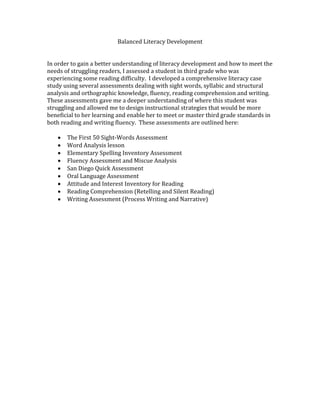module 16 professional reflection part 2
•Download as DOCX, PDF•
0 likes•85 views
Report
Share
Report
Share

More Related Content
What's hot
What's hot (20)
Reading Assessment_Language Assessment - By Sheila Chei

Reading Assessment_Language Assessment - By Sheila Chei
Fluency & Comprehension Professional Development Workshop 

Fluency & Comprehension Professional Development Workshop
Similar to module 16 professional reflection part 2
Similar to module 16 professional reflection part 2 (20)
EFFECTIVE FLUENCY STRATEGIESStudent NameUniversity NameDat.docx

EFFECTIVE FLUENCY STRATEGIESStudent NameUniversity NameDat.docx
Oral Language Assessment In The Classroom 20080415

Oral Language Assessment In The Classroom 20080415
Assessment is a critical element of successful instruction

Assessment is a critical element of successful instruction
21st century language and literacy assessment.pptx

21st century language and literacy assessment.pptx
module 16 professional reflection part 2
- 1. Balanced Literacy Development In order to gain a better understanding of literacy development and how to meet the needs of struggling readers, I assessed a student in third grade who was experiencing some reading difficulty. I developed a comprehensive literacy case study using several assessments dealing with sight words, syllabic and structural analysis and orthographic knowledge, fluency, reading comprehension and writing. These assessments gave me a deeper understanding of where this student was struggling and allowed me to design instructional strategies that would be more beneficial to her learning and enable her to meet or master third grade standards in both reading and writing fluency. These assessments are outlined here: The First 50 Sight-Words Assessment Word Analysis lesson Elementary Spelling Inventory Assessment Fluency Assessment and Miscue Analysis San Diego Quick Assessment Oral Language Assessment Attitude and Interest Inventory for Reading Reading Comprehension (Retelling and Silent Reading) Writing Assessment (Process Writing and Narrative)
